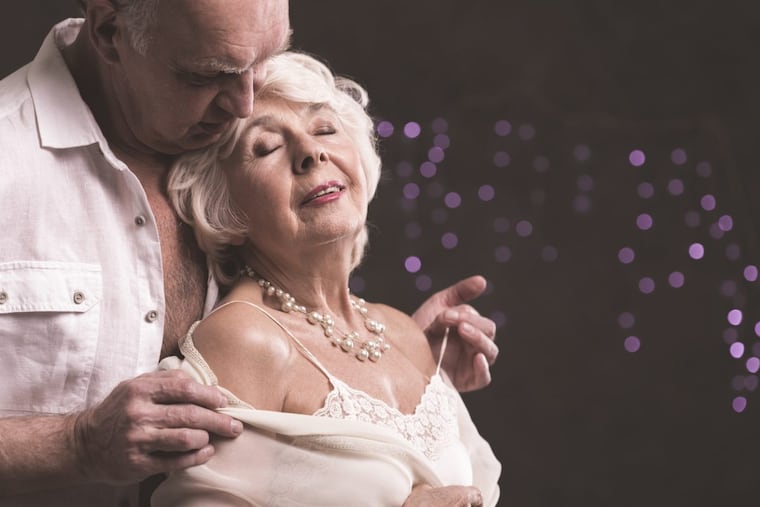Sex and aging: Embrace the changes
Sure, one has a CPAP, the other an achy back. You can still have fun, but first, you'll probably have to talk more than you did when you were younger.

If you are of a certain age, you may have received a catalog that captures the complicated way that sex fits into an aging life.
The most recent FeelGoodStore.com print catalog starts out with five pages of comfortable and reasonably fashionable shoes, the sort of product that likely wouldn't interest inquisitive grandchildren.
Then, boom, there's a two-page, hot pink spread of fancy vibrators — from the "discreet, petite and powerful" Mini Travel Vibe to the $99 G-spot stimulator with "bunny's ears" that stimulate with "seven levels of escalation." Then we're on to prostate stimulators and an enlargement pump.
Turn the page and you can buy assisted-breathing (CPAP) masks and pillows that prevent hip and knee pain. Then: incontinence briefs and boxers. Subsequent pages offer products for all manner of aches, pains and unsightliness. The catalog ends on a positive note with exercise shoes and some "negative ion" bracelets that supposedly help you feel energized.
[Join the Inquirer for the inaugural 55+Thrive Lifestyle Conference. Get tickets here.]
People are interested in sex long after many parts of their bodies need an assist, but we had questions. Does the Flickering Arouser, for example, sell as well as the magnification glasses and brightly patterned compression socks? Are they often purchased together? Does the Shegasm Focused Clitoral Stimulator actually work? Alas, officials from AmeriMark, the company that produces FeelGoodStore.com, did not return our calls.
So, we turned to Robin Goldberg-Glen and Melanie Davis, co-presidents of Widener University's Sexuality and Aging Consortium, for information about what older people really want. There were a few points they agreed about. First, while some people eventually reach an age when they are ready to give up on intimacy, many do not. Also know that communication is essential for satisfying sex during later life. Remember to keep an open mind about new toys, props, positions, medications and routines plus a sense of humor about CPAPs, dentures, stiff hips, not-so-stiff manly parts, and extra pounds. Lastly, lube is your friend.
Goldberg-Glen, who teaches social work, is the big-picture thinker who puts sex in social context. Scholars have been paying a lot more attention to sex among older people in the last decade, she said, but doctors typically still don't ask older patients about it. They should. Older adults need more education about how their bodies are changing, so they can reframe their expectations. Orgasms will likely take longer. Sex doesn't have to mean intercourse. All of us need to know that the exercising and healthy eating we should be doing to protect our hearts also leads to better blood flow during sex, she said. Those at the oldest ages may need to ask about sex policies when they move into senior housing or nursing facilities.
The most important thing, though, is that relationships are paramount. "Loneliness is the number one complaint for older adults," she said. "It's not sex."
Good relationships rest on good communication, which is more necessary than ever when partners need to compensate for aging changes. If older people are looking for new partners, they also need to address the uncomfortable topic of sexually transmitted diseases. But even that can be extra-complicated. In her classes, Goldberg-Glen does an exercise meant to show her students what it's like for an older man with arthritis to put on a condom. Students wear latex gloves so their sense of touch is diminished. Their knuckles are wrapped with tape so their fingers don't work well. Their glasses are clouded with Vaseline. Then they have to open a condom package and put the condom on a banana. "They have this epiphany," Goldberg-Glen said.
To date, there is no condom aimed at older men. Goldberg-Glen wishes she knew how to design one. "If I knew how to do that, I would not be teaching anymore," she said.
Davis, a sex educator who recently created a curriculum for older adults for the Unitarian Universalist Association, focuses on practical aspects of sexuality.
She said it's important for people to have realistic expectations. It's normal for men to start having slower erections as early as their mid-40s. Vaginas become drier, making sex less comfortable. Hormonal creams, vaginal moisturizers and lubricants can help. If they go long periods without intercourse, women's vaginas can become smaller. They may need stretching before sex with a new partner. Men's penises don't get smaller with time, but it can look as if they have if the men have gained a lot of weight.
"As we age," David said, "we have to rethink the sexual scripts that have worked for us all of our lives." What if orgasm or penetration is no longer essential? Maybe the mechanics are better if a different partner is on top. Maybe someone who has always liked morning sex might have to wait now until after the arthritis medicine has kicked in. Some folks may be too tired in the evening. What works for them now might be choosing to have sex between afternoon naps and evening cocktails. "Three to five is their playtime," she said.
Older people often develop an appreciation for the "little joys of sexuality," Davis said.
As for one of the mood killers that many aging baby boomers are dealing with — adult children who've moved back home — Davis said both generations need to talk about how they'll handle privacy in the house. "Is it the worst thing in the world if your adult children hear you having an orgasm?" she asked. "I would hope they would cheer you on."